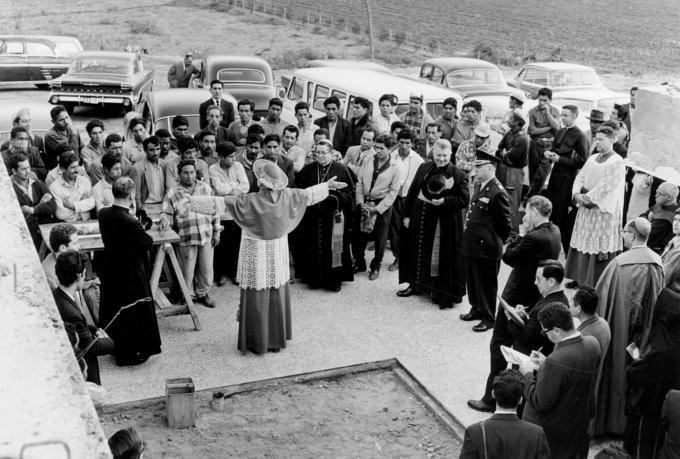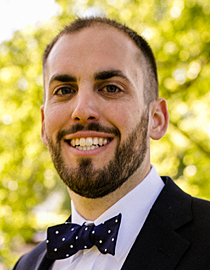
Culture
In regard to the people of Latin America, he writes "do not condemn them," we should admire those who have maintained their faith under such circumstances and now pledge our aid to them.

Lester
This week is the final installment of our series commemorating the 50th anniversary of the death of Cardinal Richard Cushing and focuses on another area in which he made a significant impact both within the archdiocese and abroad -- missionary work.
The Archdiocese of Boston has a history with missionary societies dating well before Cardinal Cushing took an interest. With the creation of the Diocese of Baltimore in 1789, Boston became a mission of the diocese until being declared a diocese of its own in 1808. The new diocese had insufficient numbers to support itself and appealed to missionary societies in Europe for financial assistance.
At the request of Bishop Benedict Fenwick of Boston, the Society for the Propagation of the Faith, founded in France in 1822, provided financial assistance to the Diocese of Boston from about 1830 until 1845, when it was better established. Contributions resumed in 1854 to help care for the influx of Irish Catholic immigrants during the mid-19th century, but, within a few decades, the diocese transitioned from beneficiary to one of the most prominent contributing dioceses in the world, culminating in a diocesan office of the Society for the Propagation of the Faith being created in 1898.
It is believed Cardinal Cushing first became interested in missionary work while at St. John's Seminary, Brighton. He was active in Academia, a student organization that had first met on March 27, 1901, with the purpose of teaching seminarians about missionary work and raising funds for that cause. Its establishment is credited to Msgr. Joseph V. Tracey, first director of the Propagation of the Faith in Boston, who modeled it on a similar organization at St. Mary Seminary, Baltimore, where he previously served on the faculty.
Cardinal Cushing served as the secretary of Academia during the 1918-1919 school year. While serving as president during the 1920-1921 school year, he delivered a speech at the convention of the Catholic Students' Mission Crusade in Washington, DC.
In 1922, the year after his ordination, Cardinal Cushing requested to be sent abroad to serve as a missionary, but was instead named assistant director of the Boston Society for the Propagation of the Faith, and, in 1928, succeeded Msgr. Joseph F. McGlinchey as director. In his first year as director, he established the Sen Fu Club and Jim Hennessey Club, auxiliary organizations for women and men, respectively, to help raise funds for missions. His tenure is also noted for a significant increase in contributions by the archdiocese, an early sign of his renowned fundraising ability, and ended in 1944 when he resigned to assume the role of Archbishop of Boston.
In addition to being installed as Archbishop of Boston in 1944, Cardinal Cushing revitalized Academia, which had ceased meeting and publishing its newsletter in 1927. Part of the revitalization saw the Priests' Mission Academia come into existence, resembling the seminarian organization but for those who were already ordained. They met at the seminary monthly and began a new publication called The Mission Academia.
These efforts were further encouraged by what was happening in Rome. On April 21, 1957, Pope Pius XII promulgated "Fidei Donum," which urged parts of the world in which the Catholic Church was well-established to share their resources with missions in need, primarily Latin American and Africa. In April 1958, he established The Pontifical Commission for Latin America as the instrument to help meet this goal.
Cardinal Cushing embraced this message and, on July 25, 1958, the feast of St. James, announced the creation of the Missionary Society of St. James the Apostle, which would facilitate the process of sending priests to Latin America, primarily to Bolivia, Ecuador, and Peru. It would accept priests who agreed to serve for five years before returning to their home dioceses, arranging their travel, training them in native languages and cultures, and assigning them to local missions or parishes where help was needed.
During Cardinal Cushing's lifetime, the organization would take root, breaking ground on a language education center near Lima, Peru, in 1960, and, in 1963, approving its first constitution. The society was headquartered in Boston, first at 49 Franklin Street, where the Society for the Propagation of the Faith was located, and, in 1967, moved to St. Stephen Church in the North End of Boston where it remains today.
In Cardinal Cushing's papers resides a text titled "The Church in Latin America" in which he outlines his concerns about the Catholic Church in the region, written in his role as episcopal chairman of the Catholic Welfare Conference's Latin American Bureau.
He worries that Catholics in the region have "wandered like lost sheep away from the fold of the Church" due to a lack of priests, estimating one priest per 6,000 Catholics in the region. The root of the problem, in his mind, is that colonial powers brought Catholicism to the region but did not create the mechanisms to support it once the nations regained independence.
In regard to the people of Latin America, he writes "do not condemn them," we should admire those who have maintained their faith under such circumstances and now pledge our aid to them. Nor does he intend "to condemn the present social, political or economic order in Latin America. We have had enough of that. I am interested in action."
Action consisted of prioritizing the region in terms of available aid for missions, including sending an estimated 5,000 priests that could be spared from dioceses in the United States. He proposes first balancing the inequities in the region by finding the most vulnerable people suitable housing, access to food and decent wages. Once that was obtained, then the missionaries can focus on spiritual needs, he argues, stating "we cannot enlighten those whose bodies are wasting away from hunger and the lack of proper care resulting from slave wages."
Continuing, he suggests a seminary in the United States where Latin American priests can come to study before being incardinated in their home dioceses, and to train priests from other parts of the world who wish to relocate to Latin American permanently. It was his hope that the missionaries would inspire enough Latin American Catholics so that within a generation there would be enough native priests to meet the region's needs.
- Father Thomas Ryan, CSP, directs the Paulist North American Office for Ecumenical and Interfaith Relations in Boston.
Recent articles in the Culture & Events section
-
Happy New Year!Eileen McLaughlin
-
Joyful hopeMichael Reardon
-
Scripture Reflection for Jan. 5, 2025, The Epiphany of the LordDeacon Greg Kandra
-
Tolkien's world, still popular on the big screen, began with faith and wordsCecilia Hadley
-
Scripture Reflection for Dec. 22, 2024, Fourth Sunday of AdventDeacon Greg Kandra























